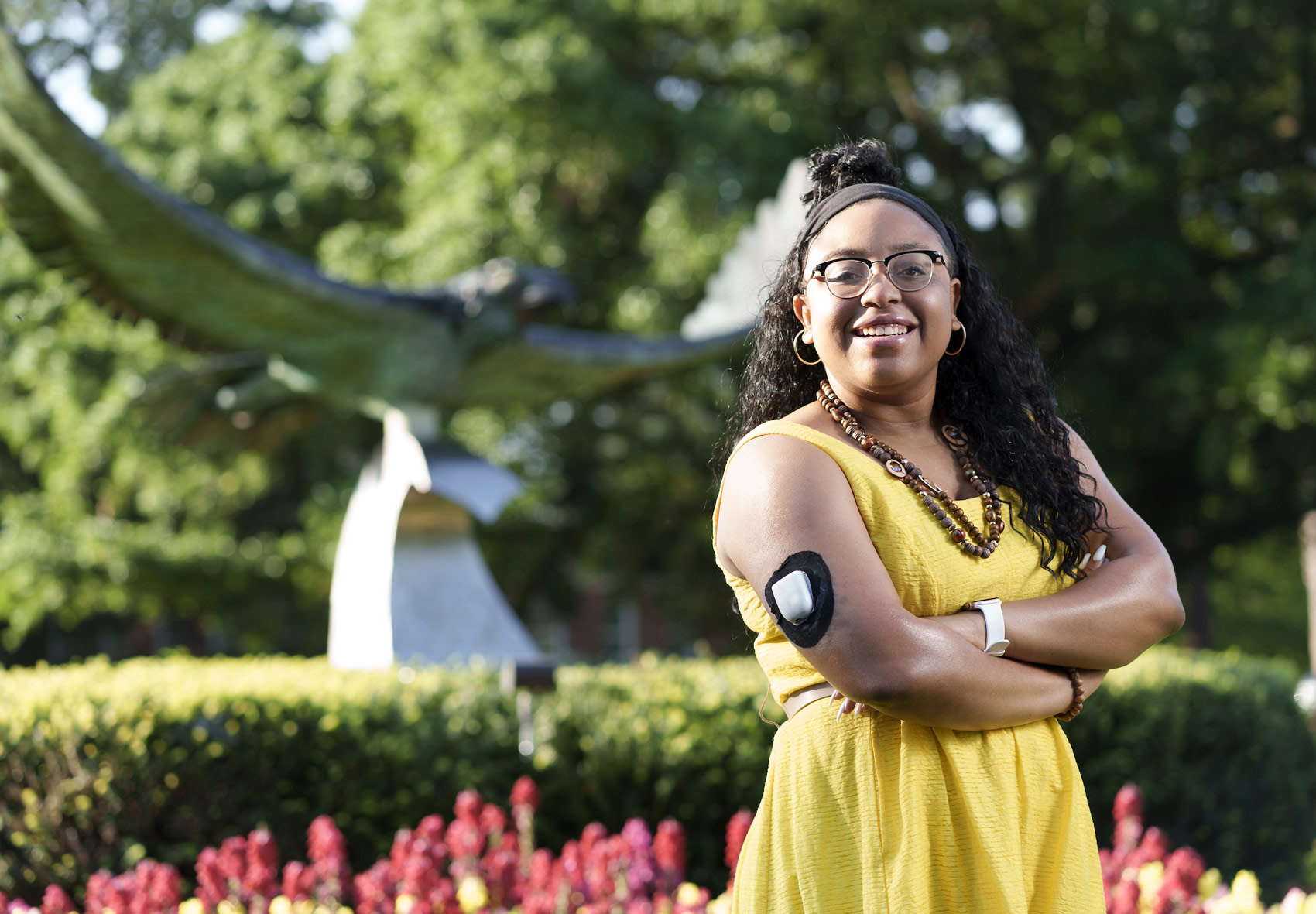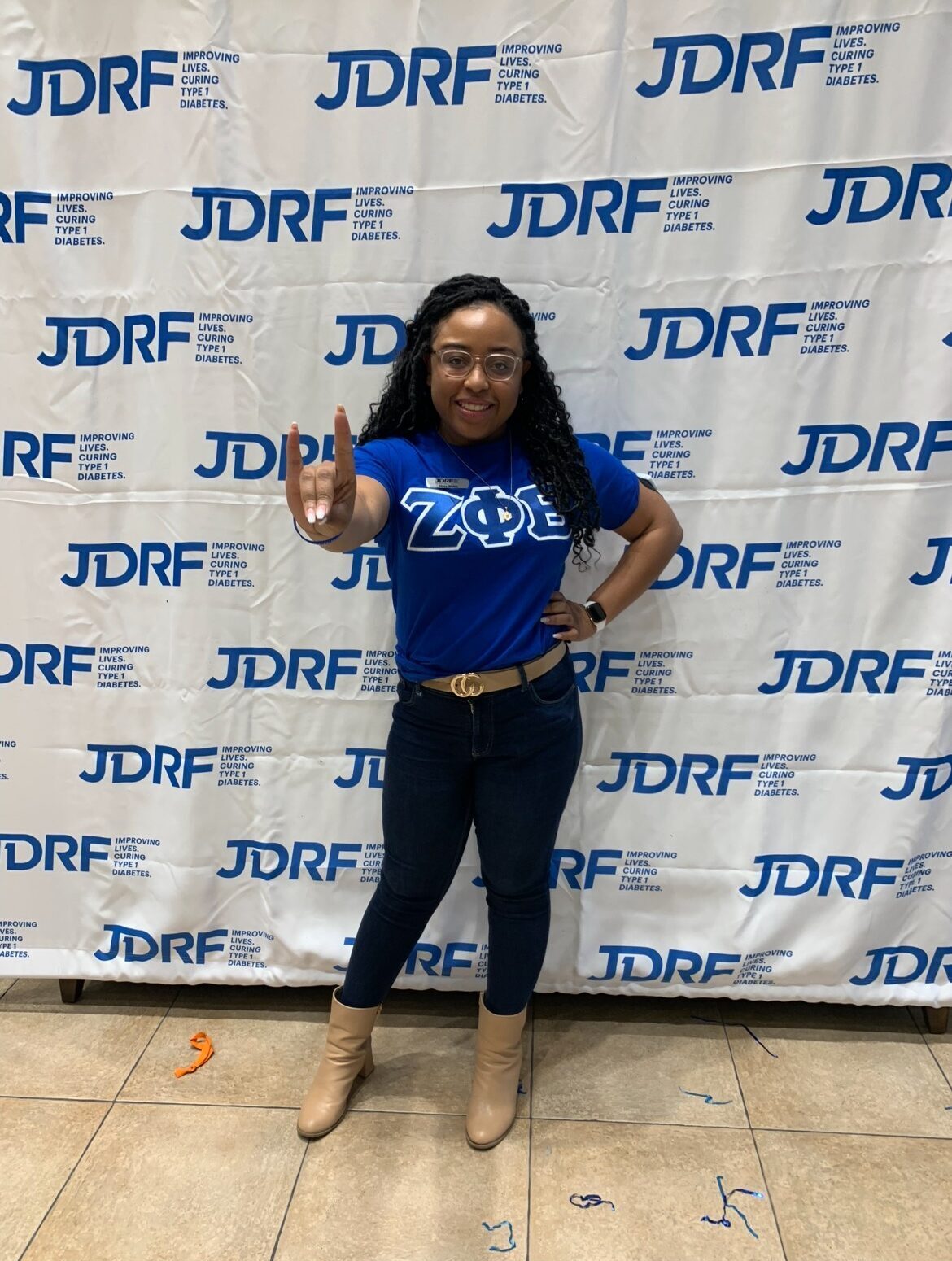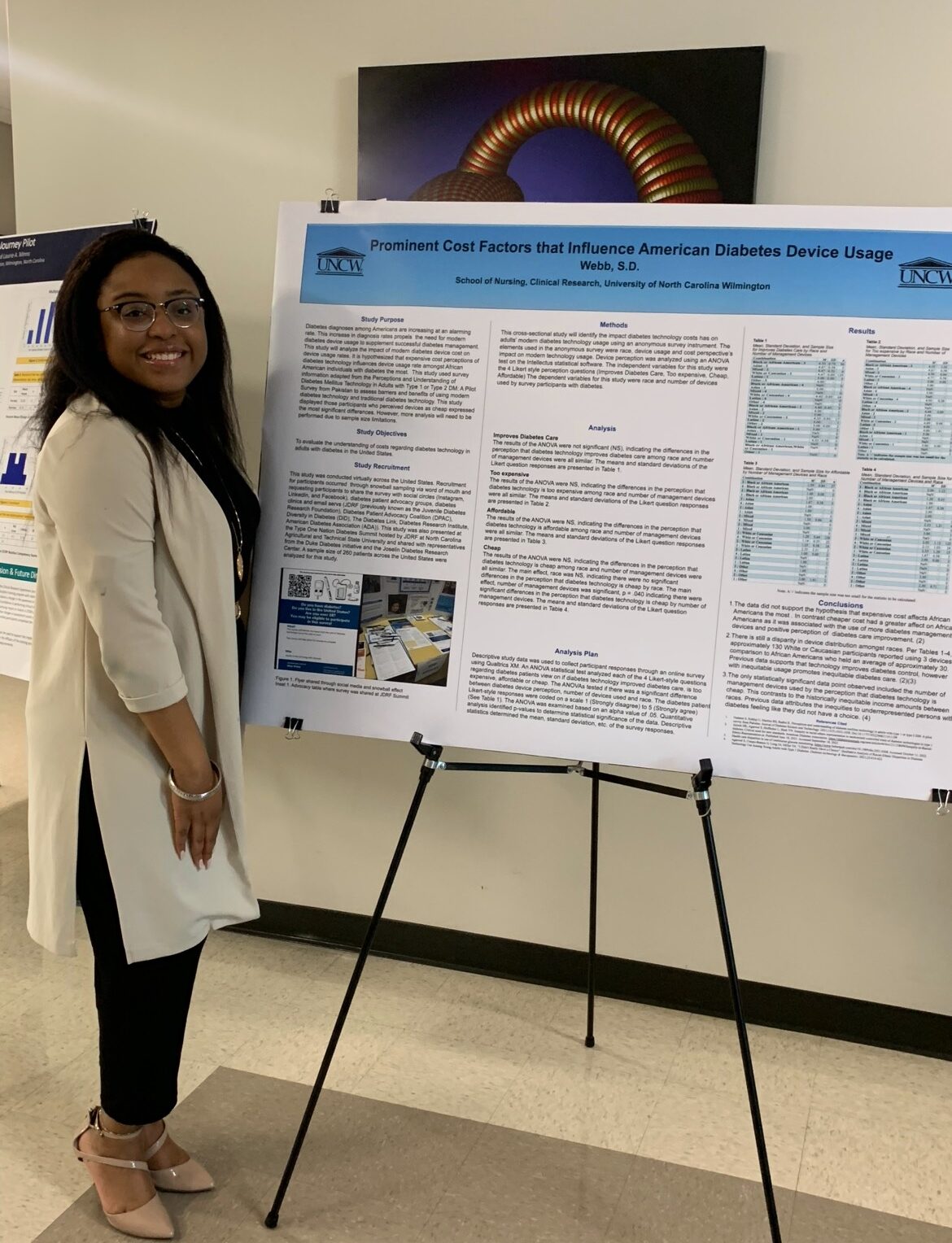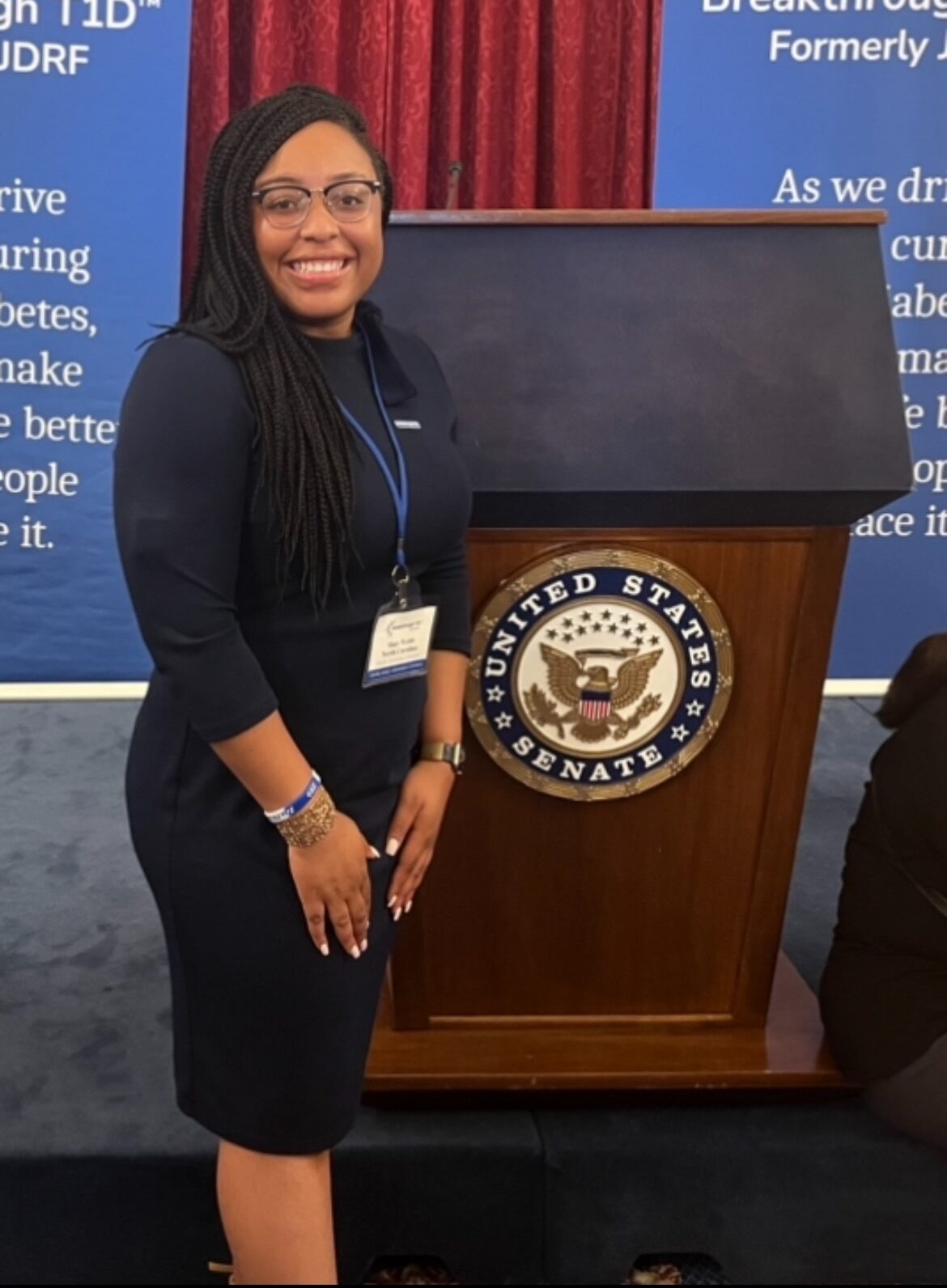
For many, a medical diagnosis can feel like a roadblock—an unexpected detour that reshapes life’s trajectory. But for some, it becomes a catalyst for change, a call to action that ignites a lifelong commitment to advocacy. This is the story of Shay Webb, a diabetes advocate and researcher, whose journey from patient to policy influencer is paving the way for better healthcare access, representation, and awareness—particularly for communities of color.
From Diagnosis to Awareness
Growing up in Wilmington, NC, a predominantly white community, Webb was diagnosed with Type 1 diabetes at just eight years old and later with rheumatoid arthritis at eighteen. These diagnoses came with significant challenges—not just in terms of managing her health but also in confronting the widespread misconceptions surrounding diabetes.
“One thing I noticed was that type 1 diabetes was not widely recognized among patients of color due to a lack of mobilization. Many people assumed type 1 was juvenile diabetes, which isn’t always the case. If you were a person of color, people often assumed you had type 2 diabetes,” Webb tells BlackDoctor.org.
Seeing firsthand how this lack of representation impacted treatment and awareness, Shay realized the need for mobilization within minority communities.
RELATED: 9 Tell-Tale Signs Your Child Has Type 1 Diabetes
Education and Research: Building a Foundation for Advocacy
Determined to make a difference, Webb pursued an undergraduate degree in Clinical Research to understand the medical and scientific landscape of diabetes care. Her passion for addressing disparities led her to pursue a master’s degree in Clinical Research and Product Development, focusing on diabetes accessibility, technology, and its impact on minority communities. Through research, she identified significant gaps in healthcare access, particularly in diabetes technology. This realization fueled her advocacy, transforming personal experience into data-driven change.
“My advocacy work led me to present my research at the North Carolina General Assembly, where I highlighted diabetes technology accessibility and cost perspectives among minority communities. On a national level, I represented North Carolina in Washington, D.C., advocating for policies like the Diabetes Screening for At-Risk Populations Act,” she shares.

Stepping into Advocacy and Policy Work
Webb’s advocacy journey began early, with involvement in organizations like JDRF (now Breakthrough T1D), where she served as an ambassador for major fundraising and awareness events. These experiences highlighted the severe underrepresentation of Black voices in diabetes advocacy.
As she delved deeper into the political aspects of healthcare, Webb took on the role of state facilitator for diabetes advocacy in North Carolina. This position involved preparing fellow advocates for meetings with policymakers, ensuring they were equipped with research, white papers, and the confidence to push for legislative change.
A defining moment in her advocacy came when she was selected as one of three students to present her research on diabetes technology accessibility at the North Carolina General Assembly. This opportunity reinforced the power of advocacy in driving systemic change.
Taking Advocacy to the National Stage
Webb’s work quickly expanded beyond North Carolina. As the state’s sole representative for national diabetes policy discussions, she took on the responsibility of advocating for over 1.27 million North Carolinians living with diabetes.
Collaborating with South Carolina legislators and former representatives, she championed policy initiatives like increased diabetes screenings and cost-effective treatment options. One major breakthrough was advocating for the adoption of Teplizumab, a groundbreaking therapy that can delay the onset of Type 1 diabetes by two years. Given that the annual cost of diabetes in the U.S. exceeds $406 billion, such advancements could significantly reduce financial and emotional burdens on patients.

Expanding Disability Advocacy: The North Carolina Statewide Independent Living Council
In addition to her diabetes advocacy, Webb serves on the North Carolina Statewide Independent Living Council (NC SILC)—a governor-appointed council dedicated to providing resources for people with disabilities across the state. Her role ensures that Disability Resource Centers (DRCs) have adequate funding, staffing, and support. Having been appointed for two terms, her work has been instrumental in shaping policies that improve accessibility and inclusion.
Breaking Stigmas: Diabetes, Mental Health, and Holistic Care
Beyond legislative efforts, Webb is passionate about addressing the mental health challenges associated with diabetes. Research has shown that people with diabetes are at a higher risk of developing depression and other mental health conditions. Despite this, the stigma around chronic illness often prevents individuals from seeking the support they need.
Webb challenges the misconception that people with diabetes are limited in what they can achieve. She often encounters reactions like, “How are you doing all this while living with diabetes?” Her response is simple: “People with diabetes can do anything and everything—except eat cookies with poison in them.”
This statement underscores the idea that diabetes does not define a person’s capabilities. It may require extra steps—monitoring blood sugar, administering insulin, and balancing nutrition—but it does not limit potential.
Webb also advocates for holistic healthcare, emphasizing the need for medical providers to see patients beyond just their diabetes diagnosis. She shares an example of her experience with an endocrinologist who questioned her vegan lifestyle, highlighting the disconnect between providers and patients’ full health profiles.
“Doctors should look at the whole patient, not just the disease,” she stresses. “If we shift our perspective on diabetes, we can improve outcomes and overall well-being.”

Empowering the Next Generation of Advocates
Shay is committed to mentorship and education, helping young people with diabetes navigate their diagnosis and develop self-advocacy skills. She encourages parents to foster independence in their children early on, much like her mother did.
“I remember when I was diagnosed. I was raised in a single-parent household—just me and my mom. My grandparents were very close to me as well, but she was the one who raised me. The entire week I was in the hospital, and it was like getting information out of a fire hose for them. And I was kind of just in limbo—I didn’t fully understand what was happening,” Webb shares.
She recalls being just eight years old and learning how to inject insulin, count carbs, and explain her condition to teachers. This early independence prepared her for the challenges of adulthood and shaped her into the advocate she is today.
“After I got discharged from the hospital, my mom told me—point blank—’We can take this week to cry, do whatever we got to do, but next week it’s back to business.’ That meant she was going to teach me everything I needed to do, teach me how to talk to people about my condition and everything,” Webb says.
“Parents should let their kids live their lives. Teach them how to manage their condition, but don’t hold them back. Let them go on school trips, play sports, and do everything they want to do,” she adds.
One of the most effective tools Webb used was a script her mother provided, which she recited to her teachers:
“I have diabetes. Here’s my blood sugar kit. Here is my pen or pump. Here is what I use to treat everything. There may be times in class when it seems like I’m not paying attention or I’m asking the same question more than once. I just want to be transparent—I’m listening to you, I’m not ignoring you, but usually, there’s something wrong with my blood sugar.”
For young people newly diagnosed, Webb offers this advice:
- Find your support system—whether it’s friends, family, or an online community.
- Use your voice—advocate for your needs, whether in school, at work, or in healthcare settings.
- Seek accommodations—don’t hesitate to request workplace or academic accommodations to ensure you have the tools you need to succeed.
RELATED: Doctors Often Miss These Signs of Type 1 Diabetes in Kids

Addressing Clinical Research Disparities in the Black Community
As a clinical research professional, Webb is a strong advocate for Black participation in clinical trials. Historically, medical research has excluded or exploited Black communities, leading to distrust. However, Webb emphasizes that representation in research is crucial to developing better treatments tailored to diverse populations.
She works to dispel misconceptions about clinical trials, emphasizing that not all studies involve invasive procedures and that patients have full rights to ask questions and withdraw at any time. She also calls for increased diversity in the research workforce, ensuring that trials are conducted by teams that reflect the populations they serve.
“We need representation at every level—patients, providers, researchers, and policymakers—to create meaningful change,” Webb notes.

What’s Next for Shay Webb?
Currently pursuing her Doctor of Health Science at Campbell University, Webb is on track to graduate next year. Soon, she will officially be Dr. Webb, a title that reflects years of dedication to patient advocacy and research.
Looking ahead, she aims to continue bridging the gap between clinical research and patient advocacy, ensuring that diverse voices are included in healthcare decisions.
For those interested in connecting with Webb or supporting her mission, she welcomes outreach on:
She is available for speaking engagements, webinars, and advocacy consultations to empower more individuals in the diabetes community.

Conclusion: A Legacy of Advocacy and Change
Shay Webb attributes all of her success and advocacy efforts to her Lord and Savior, Jesus Christ. She firmly believes that it is through His grace and guidance that she has been able to impact the lives of those affected by diabetes. Her faith is the driving force behind her resilience, compassion, and dedication to ensuring that no one faces this battle alone
Through research, policy work, and community engagement, she is breaking down barriers, challenging misconceptions, and creating a future where diabetes care is equitable, affordable, and accessible to all.
Her message is clear: “Diabetes does not define you. Advocacy starts with one step—speaking up for yourself and others. If you don’t, who will?”
For those inspired by her story, the journey to change starts now.








